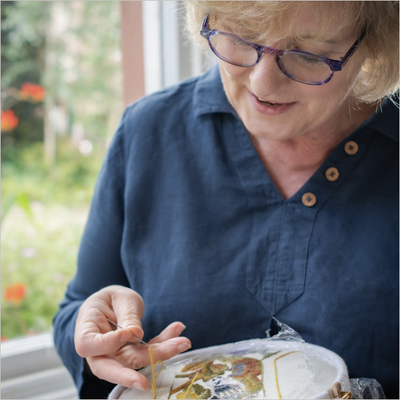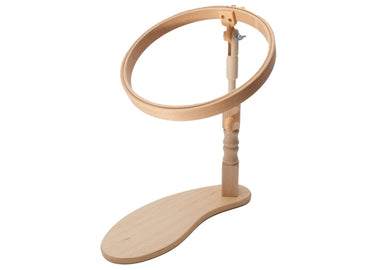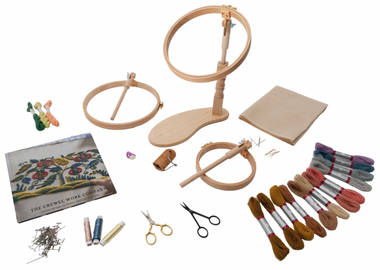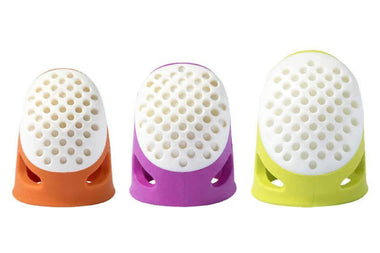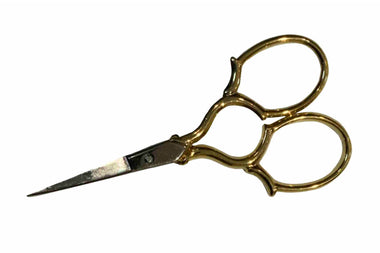The quality of the materials we work with is of paramount importance to us - for colour tone, texture, longevity and sustainability, which is why we have carefully sourced our own linen and found equally passionate people who produce the threads and wools we use. Andie Luijk of Renaissance Dyeing is one such person.
Andie uses traditional, natural dyeing processes and is dedicated to producing hand embroidery thread and fine knitting wool in Ariège, France. As we release three new redwork kits (which come with a FREE redwork Rabbit kit until the end of June) containing Andie's wonderful natural Cochineal-dyed wool, we caught up with Andie to find out about her wonderful business.
Renaissance Dyeing is a small family business. Andie works with her husband Adriaan to produce a range of over 160 naturally dyed shades of fine crewel wool, French organic Poll Dorset, and Merinos d'Arles 4-ply wools.

Andie explains: “The dye-house and winding machinery are housed in two converted barns in our little village in the foothills of the Pyrénées in France.
“I do all the natural dyeing and promotional work, while Adriaan does the mordanting (pictured), winding and labelling. Our son, Simon, has built our wonderful website renaissancedyeing.com and helps with its professional maintenance. Without this we might not have survived in these precarious economic times.

“Renaissance Dyeing was started by Margaret and David Redpath who previously distributed these naturally dyed embroidery yarns worldwide through Access Commodities as Crewel Embroidery Wool and through Madeira Threads as Broder Wul.
“Margaret and David spent three decades researching and developing this naturally dyed range, using among their resources recipes from 1870 found at their mill. They also consulted with dyeing experts worldwide. They further developed their dyeing skills on a number of prestigious dyeing commissions.
“In 2001 I took over the business, and decided to sell the yarn via specialists, designers, traders and direct through our online yarn store.
“Our family is and always has been heavily involved in ecology and sustainability. Where possible the wools we use are from organic sources or have a low carbon foot-print. The dye plants are as local as possible and grown or harvested in a sustainable way. Only ingredients with a low ecological impact are used.
“For centuries creative man has known that plants produce attractive, harmonious shades and have good fastness characteristics. Where possible at Renaissance Dyeing we work with real plant material, some such as madder and woad are harvested from our own garden.
“For the blues in the main range we use indigo and in the Elizabethan embroidery thread range, woad.
“Madder, Cochineal bugs, Logwood chips and Brazilwood chips are used for the pinks, reds, oranges and purples. Dried and sometimes fresh weld and fustic chips for the yellows. Oak bark, onion skins and cutch are used for browns.
“These traditional dyes and the resulting colours have good fastness to washing and to light, if properly cared for (as with all textiles, do not leave your naturally dyed work in strong sunlight!) As each embroidery thread dye lot is individually dyed, customers should take care to buy enough of the same dye lot to finish their project, as due to the nature of natural hand dyeing, dye lots can vary.”
As well as supplying beautiful threads and wools and kits, Andie also runs natural dyeing courses to share all aspects of traditional dyeing and techniques.
Andie’s provides the threads for our new range of Redwork Kits. The wool is a fine 2-ply merino lambs wool and it is dyed with cochineal which is sourced from a small women’s co-operative in Peru.
Buy Parrot and Nuthatch before the end of June and we will give you a Rabbit for FREE!
Renaissance Dyeing are also supplying naturally indigo dyed wool for our new design from Dunollie Castle for our Scottish Highlands & Islands Tour this August, which Phillipa is currently working on.

